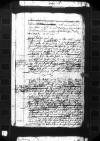List #3899
[Ioannes DANTISCUS] do UNKNOWN [possibly Mikołaj PŁOTOWSKI]Heilsberg (Lidzbark), 1542-09-28
Regest polski:
Poprzedniego dnia Dantyszek otrzymał list podskarbiego ziem pruskich i malborskiego, swego kuma (compater), Stanisława Kostki ze Sztembarku. Po jego wyjeździe do Krakowa nie ma mu nic do odpisania. Korzysta jednak z okazji, by za pośrednictwem powracającego posłańca pozdrowić adresata, małżonkę Kostki [Elżbietę z Elenborga], pannę Christinę i swoją chrześnicę.
Rękopiśmienne podstawy źródłowe:
| ||||
Tekst + aparat krytyczny + komentarz Zwykły tekst Tekst + komentarz Tekst + aparat krytyczny
Nobilis Domine, amice in Christo dilecte.
Salutem et felicitatem.
Reddidit heri
nobis is
Eamque feliciter valere optamus.
